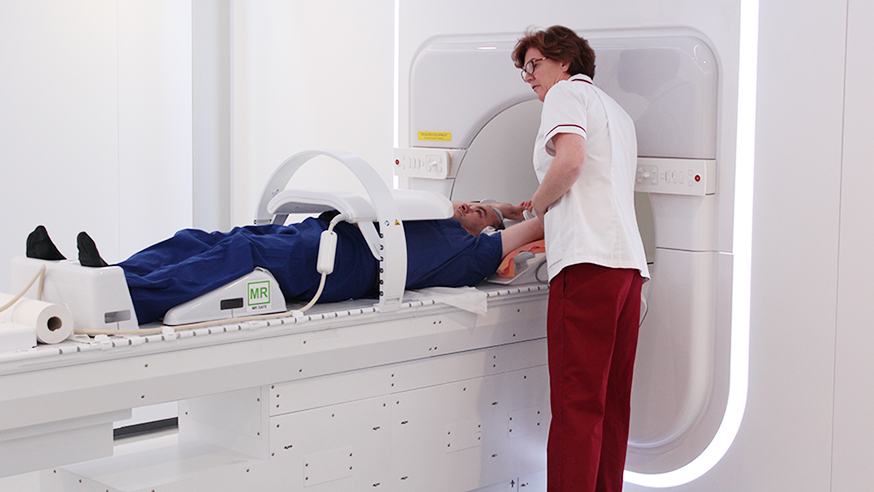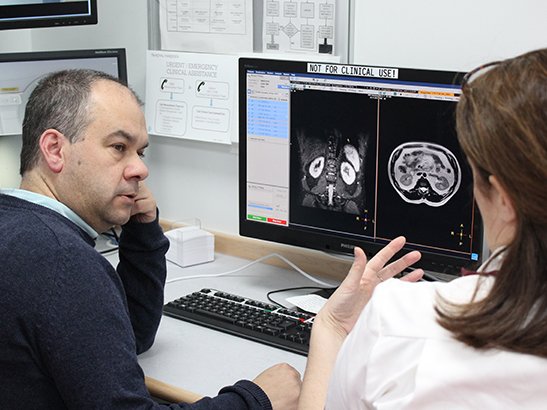
Local MP Paul Scully has volunteered to be scanned as part of research to help develop a revolutionary new type of radiotherapy machine.
He is one of the first healthy volunteers to be scanned as part of the initial trials of the MR Linac. The machine is set to transform radiotherapy treatment for cancer by allowing the cancer-busting radiation to be targeted at tumours with sharp precision.
The MR Linac is special because it can generate magnetic resonance images (MRI) while simultaneously sending X-ray radiation beams to the tumour.
Scientists expect the technology to make radiotherapy an even more successful treatment with fewer side-effects because clinicians will be able to target radiation so precisely at the tumour. They will even be able to account for the tumour moving in the body when, for example, a person breathes.
The Institute of Cancer Research, London, and The Royal Marsden NHS Foundation Trust are the first in the UK to install an MR Linac machine and just recently scanned the first healthy volunteer in the country.
The ICR’s and The Royal Marsden’s joint Sutton site sits within Paul Scully’s Sutton and Cheam constituency and the local MP attended the official opening of the unit in November 2016.
Volunteering for MR Linac research
Now returning as a healthy volunteer, Paul Scully did not receive any radiation treatment, but by volunteering to have an MRI scan he has helped to provide crucial imaging data for the development of the MR Linac before it can be trialled on cancer patients.
Clinical studies that begin next year will trial both the radiotherapy and MRI scanning elements of the MR Linac.
The local MP had his abdomen scanned as part of the PRIMER study. Led by Professor Robert Huddart, Professor of Urological Cancer at the ICR and Consultant in Urological Oncology at The Royal Marsden, this study involves producing MRI scans of healthy volunteers, followed by patient volunteers. The cancer patients will be scanned before and throughout their radiotherapy treatment.
Researchers were able to image the MP’s pancreas, small bowel, liver and kidneys during the scan. It is particularly exciting to be able to image the pancreas so clearly because of the challenges in treating pancreatic cancer using current radiotherapy techniques.
The team and wider international consortium developing the MR Linac will use the imaging information obtained to help choose the most effective ways to scan cancer patients using the MR Linac. This will be crucial during the trials that combine radiotherapy with the MRI capability.
The MR Linac machine combines two technologies — an MRI scanner and a linear accelerator — to precisely locate tumours, tailor the shape of X-ray beams in real time, and accurately deliver doses of radiation even to moving tumours.
World-leading research in Sutton
Paul Scully MP discussed how it felt to be scanned and take part in the PRIMER study:
“Thanks to The Royal Marsden and the ICR, Sutton is home to some of the most cutting-edge medical research in the world and it’s fantastic to have such an exciting piece of technology here.
“I feel truly honoured be a part of the study and, by volunteering, I’m delighted to help bring this promising new cancer treatment closer to being used to help people with cancer.”
Generating high-quality images
The MR Linac is based at the Sutton site of the ICR and The Royal Marsden, and the technology will continue to be developed ahead of the first clinical studies to treat cancer patients in summer 2018.
Professor Uwe Oelfke, Head of the Joint Department of Physics at the ICR and The Royal Marsden, who leads the physics research into the MR Linac, said:
“We managed to get some excellent images of Paul during his scan. The high quality of the images is helping us feel very confident about the MR Linac’s potential for when we begin to scan and treat patients.”
MR Linac for pancreatic cancer
The MR Linac is expected to be especially effective for cancers which move during radiotherapy or change position or shape between scanning and treatment — for instance through breathing, bladder filling or bowel changes. Examples are lung, cervical, prostate, bowel and bladder cancer.
Dr Katharine Aitken, Consultant Clinical Oncologist at The Royal Marsden and Honorary Senior Lecturer at the ICR, who assisted with the scan, said:
“The MR Linac is going to make a big difference in radiotherapy treatment for a wide range of cancers. But for pancreatic cancer, which is very difficult to treat effectively with standard radiotherapy, the fact we were able to visualise the pancreas and nearby organs so clearly is very exciting.
“We hope the MR Linac will enable us to safely increase the dose of radiation we can use to treat pancreatic tumours without damaging the surrounding healthy tissues such as the small bowel, liver and kidney.”
Making the machine possible
The installation of the MR Linac was made possible by a £10m grant from the Medical Research Council to the ICR, with additional support from The Royal Marsden Cancer Charity.
As well as the MRC funding for the MR Linac project, scientists were also funded by Cancer Research UK for much of the preparatory research and now receive support from the NIHR Biomedical Research Centre at The Royal Marsden and the ICR.
Physicists at the ICR and The Royal Marsden have been actively developing the technology for several years as part of an international consortium initiated and coordinated by the company Elekta, which makes the MR Linac (also known as the Elekta Unity Systems), and MR partner Phillips.
The UK team previously showed that it is possible to target radiation precisely at lung tumours with the MR Linac using real-time imaging. The research demonstrated that the system can be calibrated to deliver X-rays accurately in the presence of the magnetic field used to generate MRI images — overcoming a key scientific challenge.
